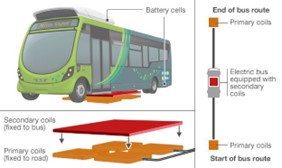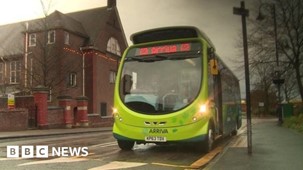- Country: United Kingdom
- Sector: Buses
- Area of Action: Urban transport
- Type of service: Municipality/public service
- Power source: Electric
- Aspects described in the case study:
- Technical features of e-buses and actual developments
- Charging infrastructure construction and operation
- Digital solutions assisting the use and operation of e-buses
- Training of e-bus drivers
- Training of e-bus maintenance staff
- Eco driving
- Health and business environment of e-bus driving
CONTEXT
The magnetic bus project in England implements eight electric buses on route number 7, which covers 25 km between the suburbs of Wolverton and Bletchley in Milton Keynes, serving some 800,000 passengers annually. It uses inductive charging technology, enabling wireless charging of up to 300 kW via magnetic pads at bus stops. This provides fast and efficient charging during regular stops, improving sustainability by reducing emissions and supporting continuity of service without significant disruption.

THE PROCESS
- Planning and investment: The project began with a detailed planning phase that involved route assessment, identification of infrastructure needs and allocation of funds. The initial investment was considerable, as it included the purchase of electric buses and the installation of induction charging technology.
- Infrastructure development: Improvements were made to existing infrastructure, installing inductive charging pads at bus stops and upgrading the electrical grid to support the additional load. These infrastructures allow buses to be recharged quickly during regular stops.
- Technology integration: The integration of inductive charging technology required collaboration with technology specialists and equipment suppliers. Buses were equipped with inductive charging receivers and monitoring systems were implemented to ensure the proper functioning of the technology.
- Training programs: Extensive training programs were developed for drivers and maintenance personnel. These programs included training on the safe operation of electric buses and the management of new charging technology. Practical and theoretical sessions were conducted to ensure staff competency.
- Awareness campaigns: To ensure public acceptance and proper use of the new buses, awareness campaigns were launched. These included community meetings, distribution of information brochures and online resources explaining the benefits and operation of electric buses.

IMPACT
- Environmental benefits: The transition to electric buses has significantly reduced carbon emissions, contributing to a cleaner and more sustainable environment in Milton Keynes.
- Operational efficiency: Inductive charging technology has improved operational efficiency by allowing charging during regular stops, minimising downtime and ensuring a continuous service.
- Public Health: Reduced emissions and reduced air pollution have had a positive impact on public health, reducing respiratory problems and improving the quality of life for residents.
- Economic growth: The implementation of the project has generated employment and attracted technological investment, driving economic growth in the region.
- Training and skills development: Training programs have equipped staff with new skills and technical knowledge, preparing the workforce for future innovations in sustainable transportation.
MORE INFORMATION
For more information, it is relevant to mention that the trial is aligned with local and national policies aimed at reducing carbon emissions and promoting sustainable transportation. The initiative faced challenges such as the need for considerable upfront investments and the integration of new technologies into existing infrastructure. However, it was facilitated by supportive regional policies and funding from various stakeholders. In addition, the project highlighted the importance of community engagement and public awareness for the successful deployment of innovative transportation solutions.
MULTIMEDIA
Source:
Videos:
Relevant links:
